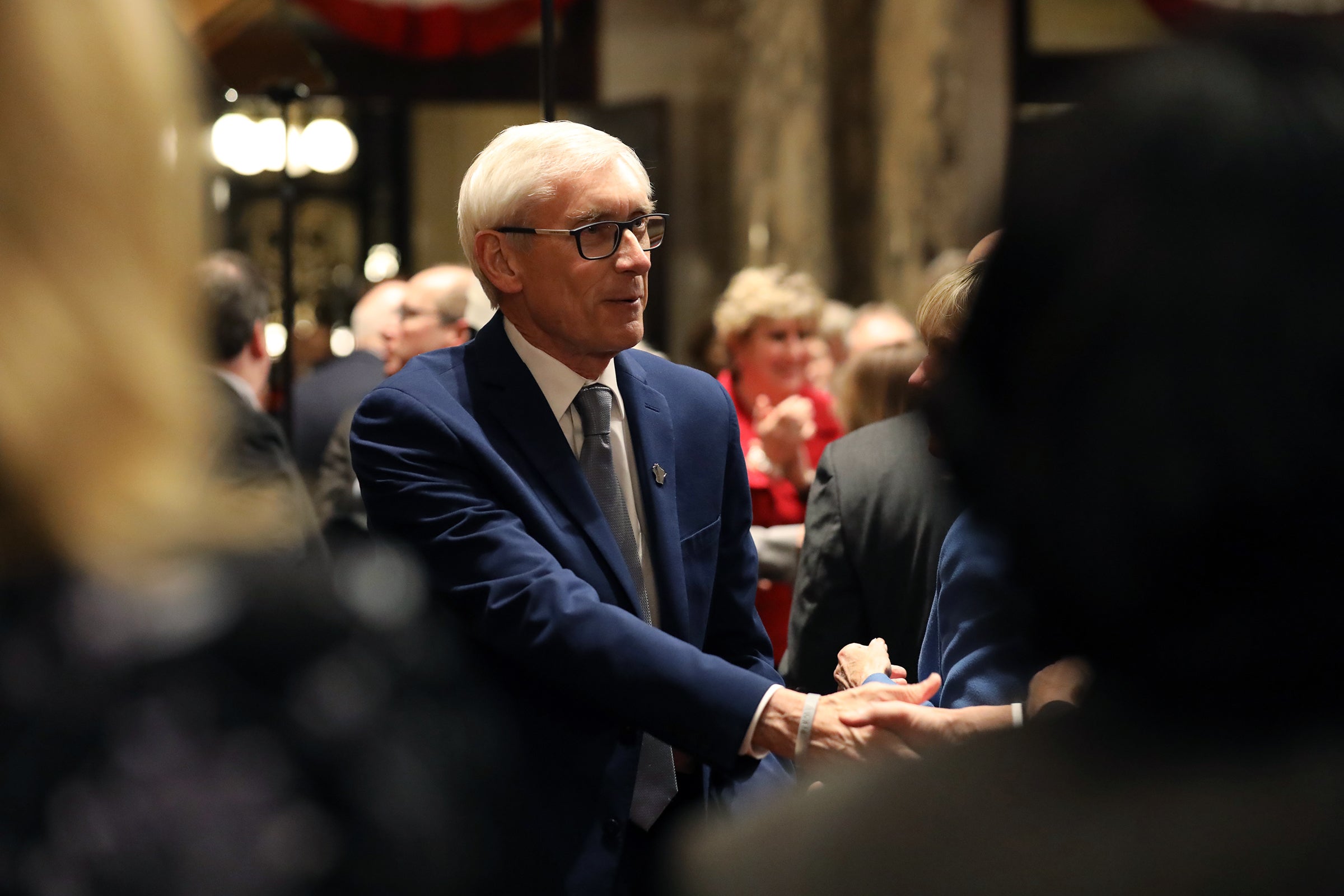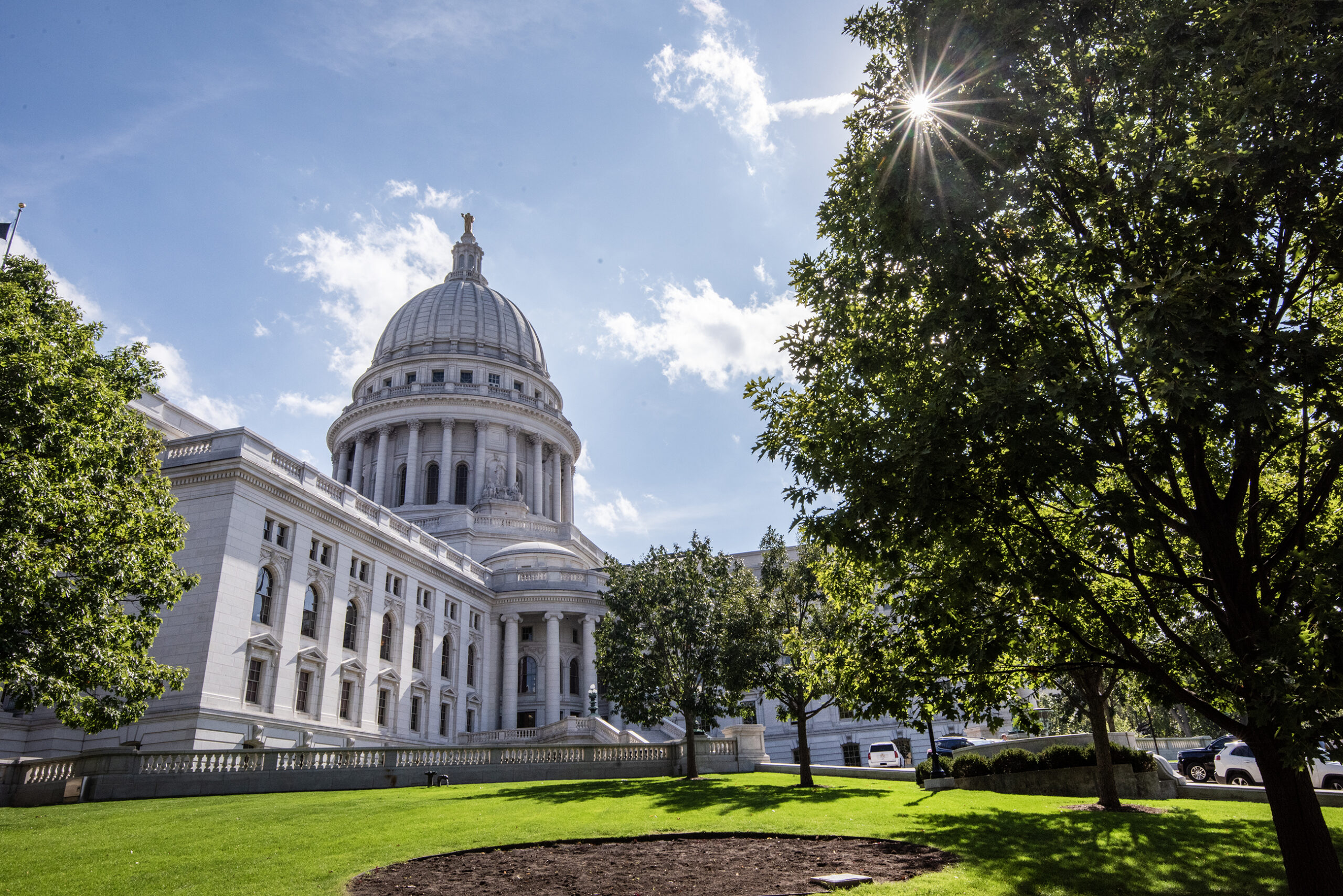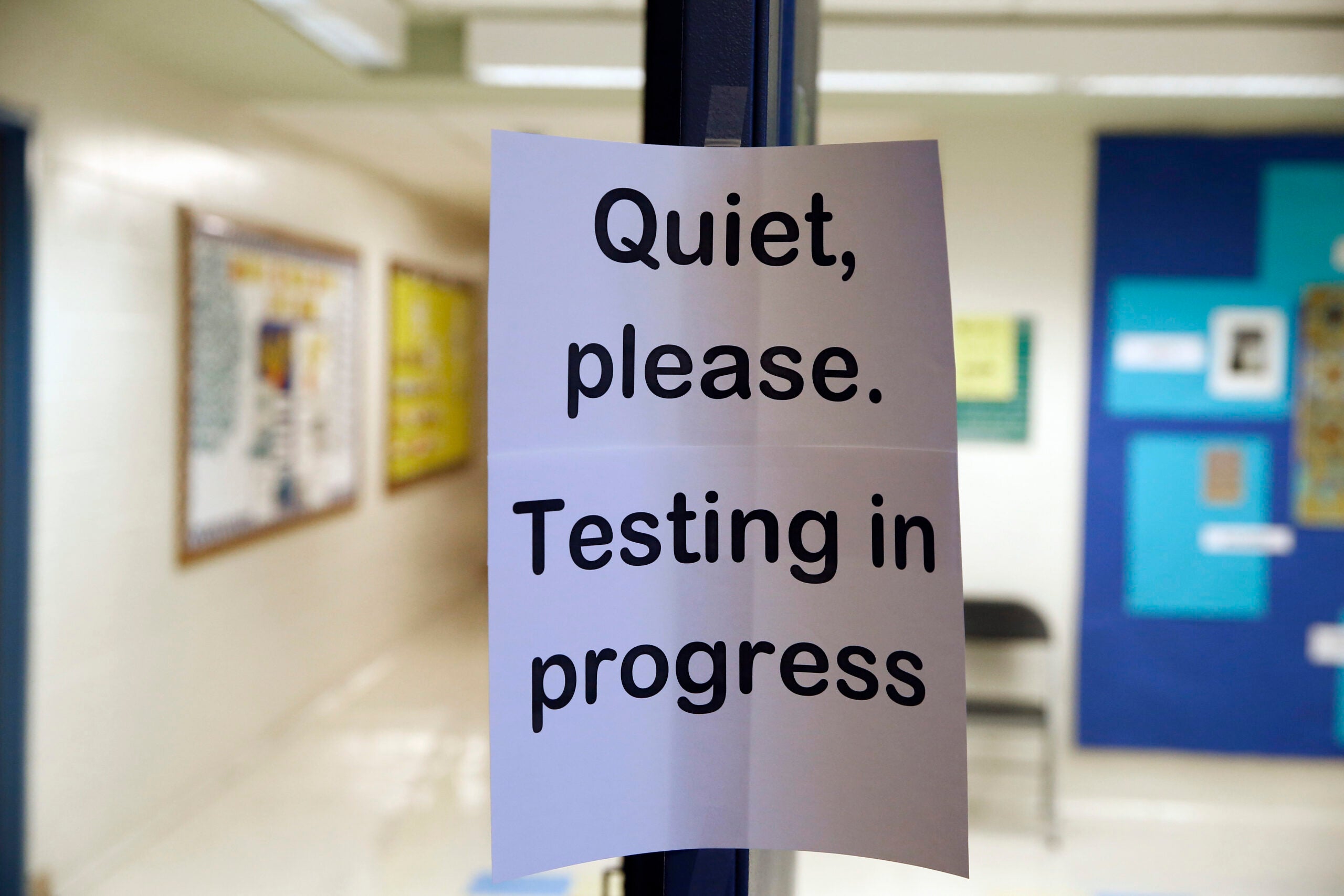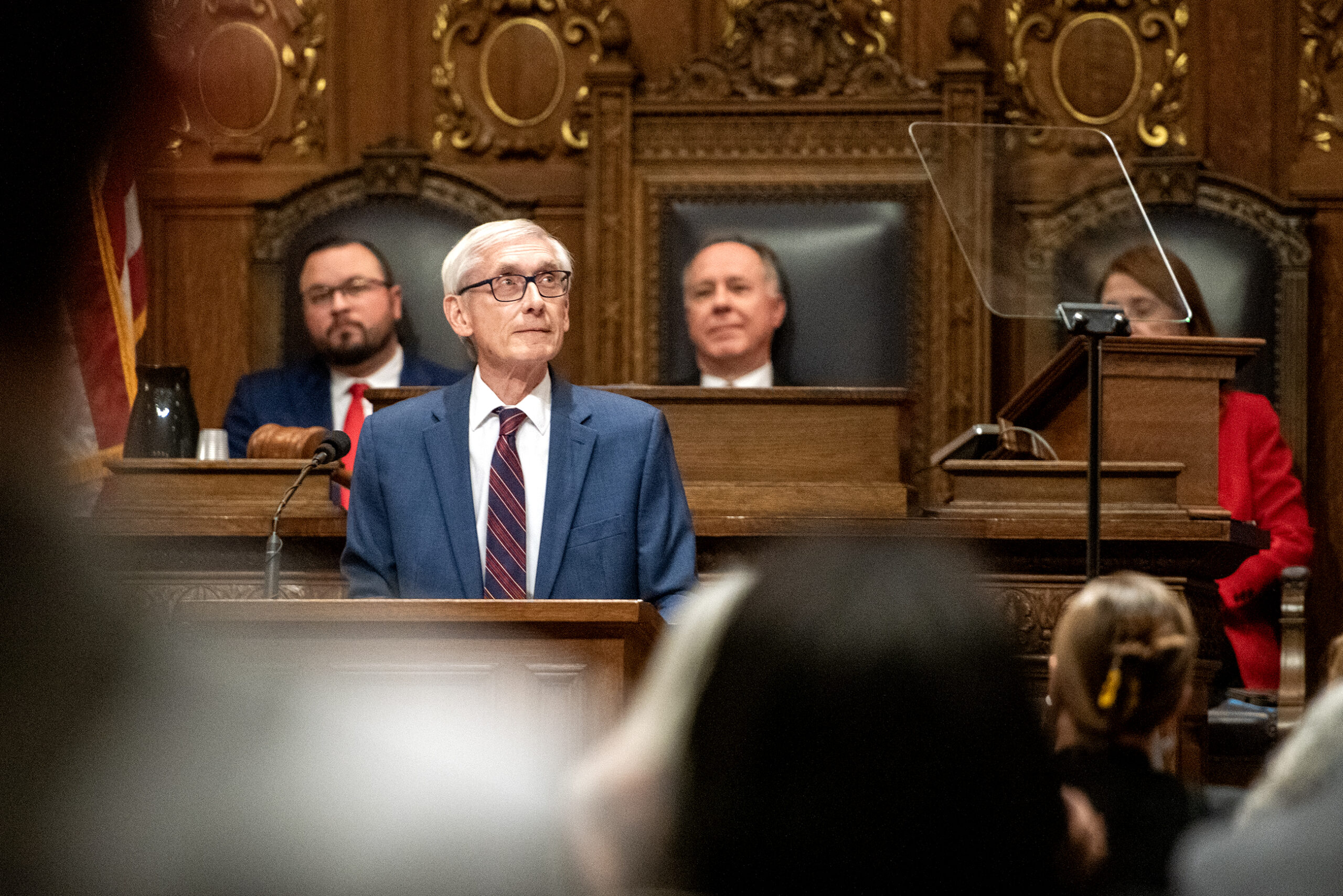Gov. Tony Evers used his second State of the State address Wednesday evening to call lawmakers into a special session to address Wisconsin’s dairy crisis.
Wisconsin lost 10 percent of its dairy farms in 2019, breaking the previous year’s record high.
“We’ve heard people who’ve said there’s no place for small farms anymore, they ought to go big or bust. Well, they’re wrong,” Evers said, referencing comments made by U.S. Department of Agriculture Secretary Sonny Perdue during a visit to Wisconsin in October. “They don’t know Wisconsin.”
Stay informed on the latest news
Sign up for WPR’s email newsletter.
Evers said he’s calling in lawmakers next week to take up “legislation to invest in our farmers, agricultural industries and our rural communities.”
The governor has previously called a special session on gun laws in Wisconsin, which GOP lawmakers gaveled in and adjourned without taking action.
Concerning the dairy proposals, Evers said Democrats will roll out a package of bills Thursday. He also used his speech to set a goal of increasing Wisconsin’s dairy exports to 20 percent of the United States’ milk supply by 2024.
[[{“fid”:”1134786″,”view_mode”:”embed_landscape”,”fields”:{“alt”:”Tony Evers speaking at podium”,”title”:”Tony Evers speaking at podium”,”class”:”media-element file-embed-landscape media-wysiwyg-align-right”,”data-delta”:”1″,”format”:”embed_landscape”,”alignment”:”right”,”field_image_caption[und][0][value]”:”%3Cp%3EWisconsin%20Gov.%20Tony%20Evers%20delivers%20his%20second%20State%20of%20the%20State%20address%20at%20the%20Capitol%20in%20Madison%20on%20Wednesday%2C%20Jan.%2022%2C%202020.%3Cem%3E%20Coburn%20Dukehart%2FWisconsin%20Watch%3C%2Fem%3E%3C%2Fp%3E%0A”,”field_image_caption[und][0][format]”:”full_html”,”field_file_image_alt_text[und][0][value]”:”Tony Evers speaking at podium”,”field_file_image_title_text[und][0][value]”:”Tony Evers speaking at podium”},”type”:”media”,”field_deltas”:{“1”:{“alt”:”Tony Evers speaking at podium”,”title”:”Tony Evers speaking at podium”,”class”:”media-element file-embed-landscape media-wysiwyg-align-right”,”data-delta”:”1″,”format”:”embed_landscape”,”alignment”:”right”,”field_image_caption[und][0][value]”:”%3Cp%3EWisconsin%20Gov.%20Tony%20Evers%20delivers%20his%20second%20State%20of%20the%20State%20address%20at%20the%20Capitol%20in%20Madison%20on%20Wednesday%2C%20Jan.%2022%2C%202020.%3Cem%3E%20Coburn%20Dukehart%2FWisconsin%20Watch%3C%2Fem%3E%3C%2Fp%3E%0A”,”field_image_caption[und][0][format]”:”full_html”,”field_file_image_alt_text[und][0][value]”:”Tony Evers speaking at podium”,”field_file_image_title_text[und][0][value]”:”Tony Evers speaking at podium”}},”link_text”:false,”attributes”:{“alt”:”Tony Evers speaking at podium”,”title”:”Tony Evers speaking at podium”,”class”:”media-element file-embed-landscape media-wysiwyg-align-right”,”data-delta”:”1″}}]]
“We have to start maximizing the efficiency in our small- and middle-sized farms, and we need to build Wisconsin’s dairy brand in international markets and increase dairy exports,” he said.
Evers also said he will work with the Wisconsin Economic Development Corp. to establish a new Office of Rural Prosperity and is also rolling out a commission that will seek input from businesses in rural parts of the state about the needs of industry there.
“In the coming months, it’s going to take more listening than talking to hear from our farmers and our rural communities about how we can continue to invest in agricultural and rural prosperity across our state,” he said. “But we have to start someplace, and we have to start today.”
Governor Also Says He’ll Act On Nonpartisan Redistricting
Evers also used his speech to announce plans to sign an executive order in the coming days to create a nonpartisan redistricting commission in Wisconsin.
Democrats have pushed for years for such a commission in the state, but Republicans who control the Legislature have declined to move the proposal forward.
The governor also included a similar proposal in his budget, but GOP lawmakers removed it.
“Our nonpartisan redistricting commission will consist of the people of our state, not the elected officials, not lobbyists, not high-paid consultants,” Evers said. “The People’s Maps Commission will visit every congressional district, hear directly from folks across our state, and draw fair, impartial maps for the Legislature to take up next year.”
The process of redrawing Wisconsin’s legislative maps will begin in 2021, after the 2020 U.S. Census is completed. Because Evers’ plan relies on an executive order, any maps developed by the commission will be recommendations and won’t carry the force of law.
[[{“fid”:”1134836″,”view_mode”:”full_width”,”fields”:{“format”:”full_width”,”alignment”:””,”field_image_caption[und][0][value]”:”%3Cp%3EWisconsin%20lawmakers%20and%20state%20officials%20listen%20to%20Gov.%20Tony%20Evers%20deliver%20his%20second%20State%20of%20the%20State%20address%20at%20the%20Wisconsin%20Capitol%20in%20Madison%20on%20Jan.%2022%2C%202020.%20%3Cem%3ECoburn%20Dukehart%2FWisconsin%20Watch%3C%2Fem%3E%3C%2Fp%3E%0A”,”field_image_caption[und][0][format]”:”full_html”,”field_file_image_alt_text[und][0][value]”:”Tony Evers speaking at podium”,”field_file_image_title_text[und][0][value]”:”Tony Evers speaking at podium”},”type”:”media”,”field_deltas”:{“4”:{“format”:”full_width”,”alignment”:””,”field_image_caption[und][0][value]”:”%3Cp%3EWisconsin%20lawmakers%20and%20state%20officials%20listen%20to%20Gov.%20Tony%20Evers%20deliver%20his%20second%20State%20of%20the%20State%20address%20at%20the%20Wisconsin%20Capitol%20in%20Madison%20on%20Jan.%2022%2C%202020.%20%3Cem%3ECoburn%20Dukehart%2FWisconsin%20Watch%3C%2Fem%3E%3C%2Fp%3E%0A”,”field_image_caption[und][0][format]”:”full_html”,”field_file_image_alt_text[und][0][value]”:”Tony Evers speaking at podium”,”field_file_image_title_text[und][0][value]”:”Tony Evers speaking at podium”}},”link_text”:false,”attributes”:{“alt”:”Tony Evers speaking at podium”,”title”:”Tony Evers speaking at podium”,”class”:”media-element file-full-width”,”data-delta”:”4″}}]]
With only about two months expected to remain in the legislative session, according to leaders, Evers also said lawmakers should take up proposals related to student debt, youth vaping and water quality.
“There’s no rest for the elected, folks, and we’ve got a lot to do to get done before anyone takes a vacation,” he said.
Evers raised the hackles of Republican leaders recently by assigning “homework” to lawmakers before adjourning the session. GOP leaders called the move “condescending.”
Democrats have rolled out proposals to curb youth vaping, but GOP leaders have criticized them for not working with Republicans during the drafting process. A bipartisan package of water quality bills was rolled out in the Assembly earlier this month.
For their part, Republicans have said a possible tax cut is among their priorities for the remainder of the session.
A Year Of Conflict Between Governor, GOP Leaders
Evers, a Democrat, has had a sticky relationship with the Republican-controlled Legislature throughout his first year in office. The past 12 months have been marked by the firing of one of Evers’ Cabinet members by the state Senate, something that hasn’t happened in at least 30 years, as well as state budget negotiations that zeroed out many of the governor’s biggest plans and campaign promises.
The Legislature — under the direction of GOP leaders — has also backed lawsuits and proposals to limit the governor’s veto powers and faced off with the administration over how to settle lawsuits involving the state.
Meanwhile, Evers has vetoed several bills approved by lawmakers, including four related to state abortion laws, and one that would have lowered taxes on the middle class. Evers didn’t agree with the funding mechanism for the tax cut, saying it was too short-sighted. The state budget ended up including a middle-class tax cut that’s projected to save the average taxpayer $136 in 2020.
The governor noted the conflicts in his speech, calling it “huffing and puffing,” but spent the majority of his address lauding accomplishments.
“I am proud of everything we accomplished in just a year’s time,” he said.
He noted more than 95 percent of the bills he has signed in his first year in office passed with bipartisan support. Those include new laws that change prescription drug prescribing practices in Wisconsin, update how hemp is regulated in the state, expand a student loan forgiveness program for teachers from minority communities and change license requirements for sign language interpreters.
Evers also pointed to laws that expand BadgerCare coverage to telehealth services in rural areas, train commercial drivers on recognizing and preventing human trafficking and make polling places more accessible to people with speech-affecting disabilities.
Republicans Rebuff Redistricting Plan, Are ‘Open’ To Dairy Special Session
Republican leaders were quick to criticize the governor’s plan for the nonpartisan redistricting commission, saying his proposal will not affect the Legislature’s plans for the next redistricting process.
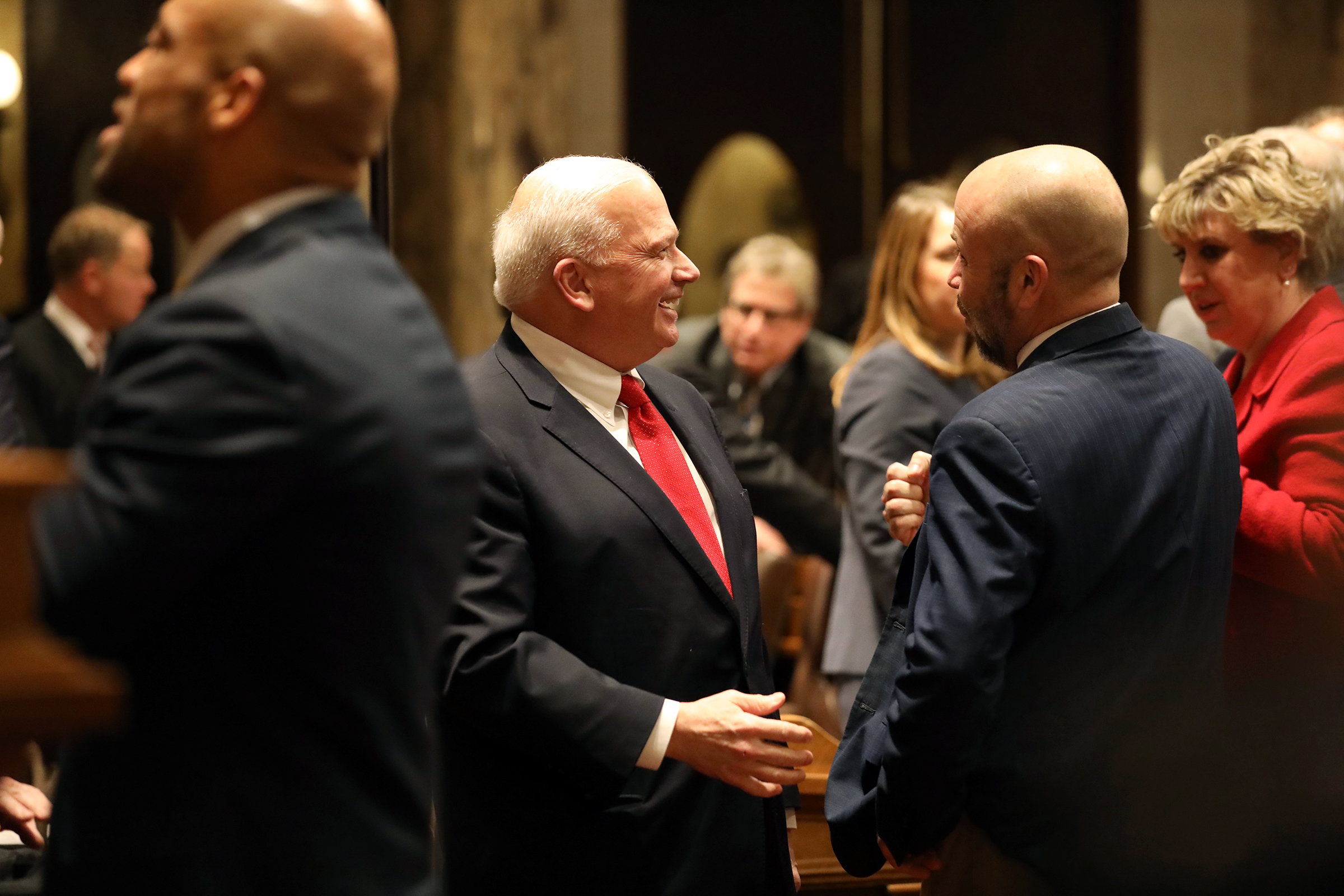
Assembly Speaker Robin Vos, R-Rochester, told reporters after the speech it was the Legislature’s constitutional duty to handle redistricting, not the governor’s.
“(The governor) can form whatever kind of fake, phony partisan process he wants to create, but I have no doubt in the end we will do it the way we always have, which is to follow the constitution,” Vos said.
Senate Majority Leader Scott Fitzgerald, R-Juneau, said what the governor proposed is “unconstitutional.”
“I’m not sure what he’s thinking,” he said.
Of the special session on dairy, Fitzgerald said Republicans share the governor’s goals of helping the dairy industry, but they’ll want to see the details of what he’s proposing.
“We need to see what he’s talking about and what kind of bills that they’ve actually drafted,” Fitzgerald said. “But we’ll work with the governor. If it comes to protecting agriculture, advancing agriculture, the Legislature’s going to work with the governor on that front, no doubt about it.”
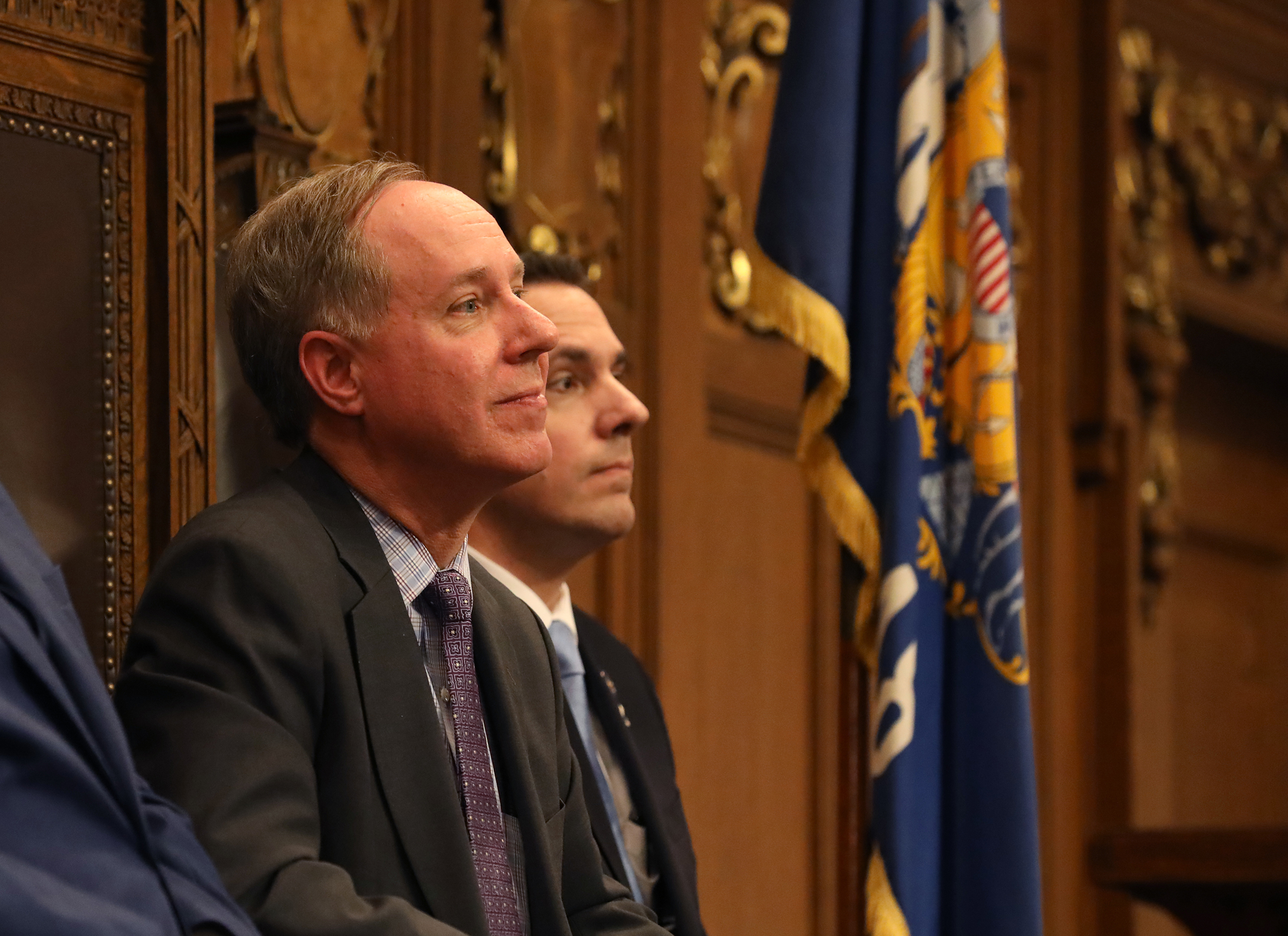
Vos echoed that sentiment, saying he would need to see the details of the governor’s plans before weighing in.
Speaking to reporters the afternoon before Evers’ address, GOP leaders said the governor hadn’t done enough to forge bipartisan compromises.
“Webster’s Dictionary defines ‘bipartisan’ as marked by or involving cooperation, agreement and compromise between two major political parties,” Vos told reporters. “It actually requires people sitting down, compromising in a give and take that we have not seen from the Evers administration.”
For example, Vos said Evers’ latest proposal to regulate vaping should be a “layup,” but Evers had yet to seek bipartisan support.
Vos and other Republicans credited Evers for signing the budget that passed the Legislature last year, even though it received no Democratic votes in the Legislature.
“I give him credit for bucking his party even though he is a liberal himself,” Vos said. “He certainly deserves credit for tacking to the right, signing a conservative budget.”
Vos said going forward, Evers should do more to tone down his rhetoric if he wants to bring people together. Asked if last year’s extraordinary session of the Legislature that limited Evers’ powers had toned down the rhetoric, Vos said it had.
“No doubt about it because it allowed for the Legislature to actually be stronger,” Vos said. “The ability from the special session to force consensus to say you have to sit at the table is something that perhaps Gov. Evers wasn’t familiar with, but he certainly should learn.”
Editor’s note: WPR’s Shawn Johnson contributed reporting to this story.
Wisconsin Public Radio, © Copyright 2025, Board of Regents of the University of Wisconsin System and Wisconsin Educational Communications Board.
